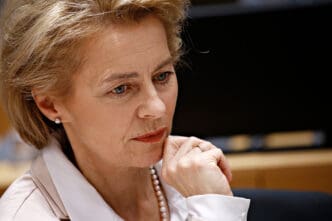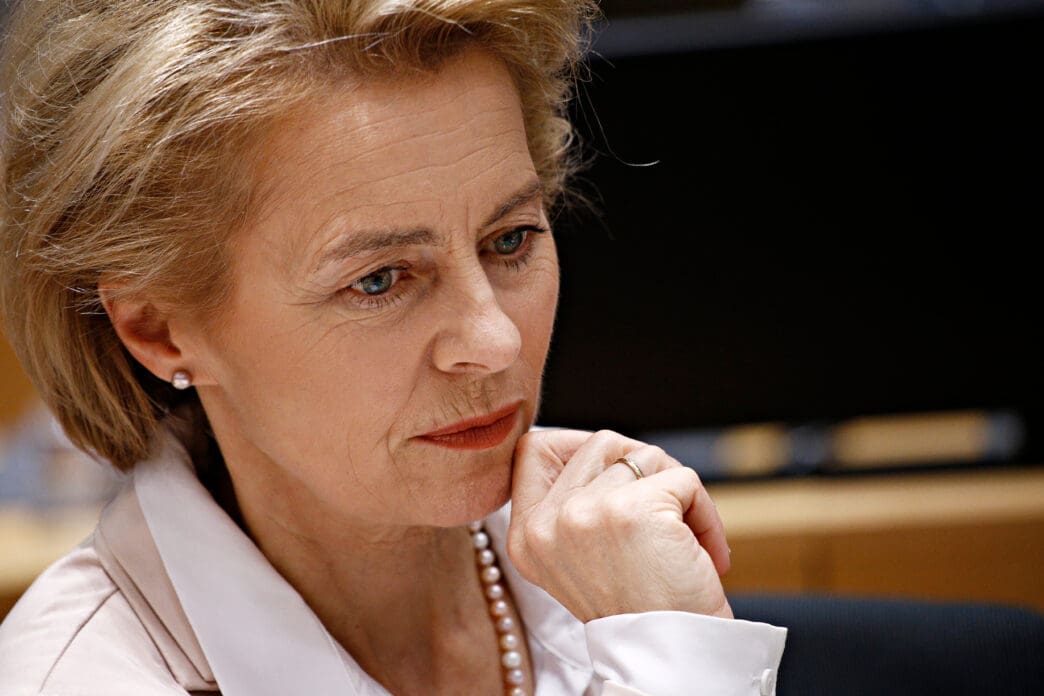Executive Summary
The Story So Far
Why This Matters
Who Thinks What?
The European Union faces mounting scrutiny across several policy fronts this week, as Commission President Ursula von der Leyen re-announced a “Palestine Donor Group” initiative that was met with skepticism, while a flagship anti-deforestation law was delayed amid allegations of U.S. pressure. Concurrently, the EU’s ethics watchdog launched an inquiry into her text messages regarding the Mercosur trade pact, adding to concerns over transparency. These developments unfold as the bloc also navigates a high-stakes race for its top prosecutor and diplomatic discussions with President Trump on Russian energy and Ukraine.
EU’s Palestine Donor Group Faces Scrutiny
Commission President Ursula von der Leyen used her United Nations speech on the two-state solution to announce a major donation drive for the Palestinian Authority, an initiative previously unveiled last July. Framed as an “international effort with regional partners,” the “Palestine Donor Group” aims to pressure the PA into reforms before moving to Gaza reconstruction.
However, the plan is largely seen as a repackaging of the EU’s existing strategy of providing funds in exchange for reform promises. Arab and Gulf backers have been hesitant to join, citing a lack of trust in the PA due to corruption allegations under President Mahmoud Abbas, who has not held elections in nearly two decades.
Despite the challenges, the Commission is reportedly in talks with Saudi Arabia to join the Donor Group. The EU remains the PA’s largest donor, committing €1.6 billion over the next three years, even as the PA faces continued pressure from Israel through settlement projects and funding cuts.
Anti-Deforestation Law Delayed Amid US Pressure Claims
A significant anti-deforestation law, a cornerstone of the EU’s Green Deal ambitions, has been delayed for a second time, now not set to take effect until late 2026. The official reason cited is an IT system failure, but other theories suggest the influence of large corporations and the centre-right European People’s Party (EPP).
Many observers, however, point to pressure from the United States as a key factor. A joint statement between Brussels and Washington affirmed that the U.S. poses “negligible risk to global deforestation” and committed the EU to addressing concerns from American producers and exporters.
Race for Europe’s Top Prosecutor Heats Up
The contest to replace Romanian prosecutor Laura Codruța Kövesi as head of the European Public Prosecutor’s Office (EPPO) is intensifying, with eight candidates presenting their credentials. Magistrates from Italy, Austria, and Spain are reportedly among those vying for the position.
The new head will inherit a portfolio of politically sensitive cases, including vaccine procurement contracts, probes linked to the European People’s Party, investigations into the European Investment Bank, and fraud concerning farm subsidies in Greece. An expert panel is expected to shortlist candidates by late November, followed by European Parliament hearings and a final decision with the Council.
Von der Leyen and President Trump Discuss Russian Energy and Ukraine
On the sidelines of the United Nations General Assembly, Commission President Ursula von der Leyen met with President Trump to discuss Europe’s energy independence from Russia. Von der Leyen affirmed the EU’s commitment to stop buying Russian oil and gas, aiming to achieve this goal earlier than the current 2027 target.
President Trump stated he would sanction Moscow only if all NATO allies agree to halt Russian oil imports and impose their own sanctions this month. Later, Trump shifted his stance on the conflict in Ukraine, expressing belief that Ukraine, with EU support, could “fight and WIN all of Ukraine back in its original form,” dismissing Russia as an economically declining “paper tiger.”
NATO and EU Respond to Drone Activity
NATO Secretary-General Mark Rutte cautioned that it was “too early” to definitively link Russia to drone activity that briefly closed Copenhagen Airport. However, Danish Prime Minister Mette Frederiksen stressed that authorities “cannot rule out in any way that it is Russia,” a sentiment echoed by President von der Leyen, who noted a “pattern of persistent contestation at our borders.”
President Trump took a harder line, suggesting NATO members should shoot down any Russian aircraft entering alliance airspace. The EU has meanwhile accelerated discussions on developing a “drone wall” to protect its airspace, with enhanced drone detection potentially achievable within a year, though a full land-and-sea barrier would take longer.
Ethics Watchdog Probes Von der Leyen’s Text Messages
The EU’s ethics watchdog has launched an inquiry into text messages exchanged between Commission President Ursula von der Leyen and French President Emmanuel Macron concerning the Mercosur trade pact. This investigation follows a reporter’s request to view the messages, which were reportedly sent on Signal with disappearing mode enabled and are now no longer available.
The revelation revives memories of the “Pfizergate” controversy regarding von der Leyen’s Covid-era texts and raises fresh questions about transparency within the Commission.
Greek Train Crash Victims Appeal to EU
Relatives of those killed in Greece’s 2023 Tempi train crash are appealing to the EU after Greek courts blocked their requests for exhumation of bodies for toxicology tests. The families allege a government cover-up, suspecting the freight train carried illegal fuel that caused a fatal explosion.
This appeal comes as Brussels is already questioning Athens over wider rail-safety failings, adding pressure on Greek authorities to address the families’ concerns.
Around the Capitals
Madrid
David Sánchez, brother of Prime Minister Pedro Sánchez, along with ten others, including Extremadura’s Socialist leader Miguel Ángel Gallardo, will stand trial on charges of malfeasance and influence peddling. Prime Minister Sánchez, whose wife also faces similar charges, has accused judges investigating his inner circle of political bias on national television.
Rome
Prime Minister Giorgia Meloni stated that Italy would recognise a Palestinian state only under specific conditions: the release of all Israeli hostages and the exclusion of Hamas from any government role. Meloni told reporters that while she is not against recognition, setting the right priorities is essential, and her government plans to submit a parliamentary motion on the matter.
Berlin
Germany has unveiled a 2026 budget that combines record borrowing with a promise of future austerity. Finance Minister Lars Klingbeil outlined €126.7 billion in new investment but warned of a €30 billion shortfall in 2027, urging welfare reforms. Critics argue the coalition is prioritising giveaways over growth-oriented projects.
Lisbon
Portugal’s defence minister, Nuno Melo, sought to downplay divisions within the governing coalition after his party opposed Lisbon’s recognition of Palestine. Melo, who also leads the conservative CDS-PP, described the government as a “plural democracy” and reaffirmed Portugal’s commitments to NATO during a visit to a fisheries patrol ship.
Warsaw
Prime Minister Donald Tusk announced that Poland would reopen its crossings with Belarus at midnight Wednesday, lifting a suspension imposed earlier this month during military exercises. The decision allows freight trains and road traffic to resume in both directions, though Tusk cautioned that the frontier could close again if security conditions worsen.
Paris
France’s public broadcaster is facing significant financial difficulties, with the Court of Auditors warning of a €40 million shortfall in next year’s budget. France Télévisions, which receives €2.5 billion in taxpayer support annually, remains hampered after a proposed overhaul collapsed in parliament.
Outlook
The week’s events underscore a period of complex challenges for the EU, balancing its global diplomatic ambitions with internal policy hurdles, transparency demands, and the ongoing need to manage geopolitical shifts. From delicate Middle East diplomacy to internal ethical inquiries and critical security discussions, the bloc continues to navigate a multifaceted agenda.








